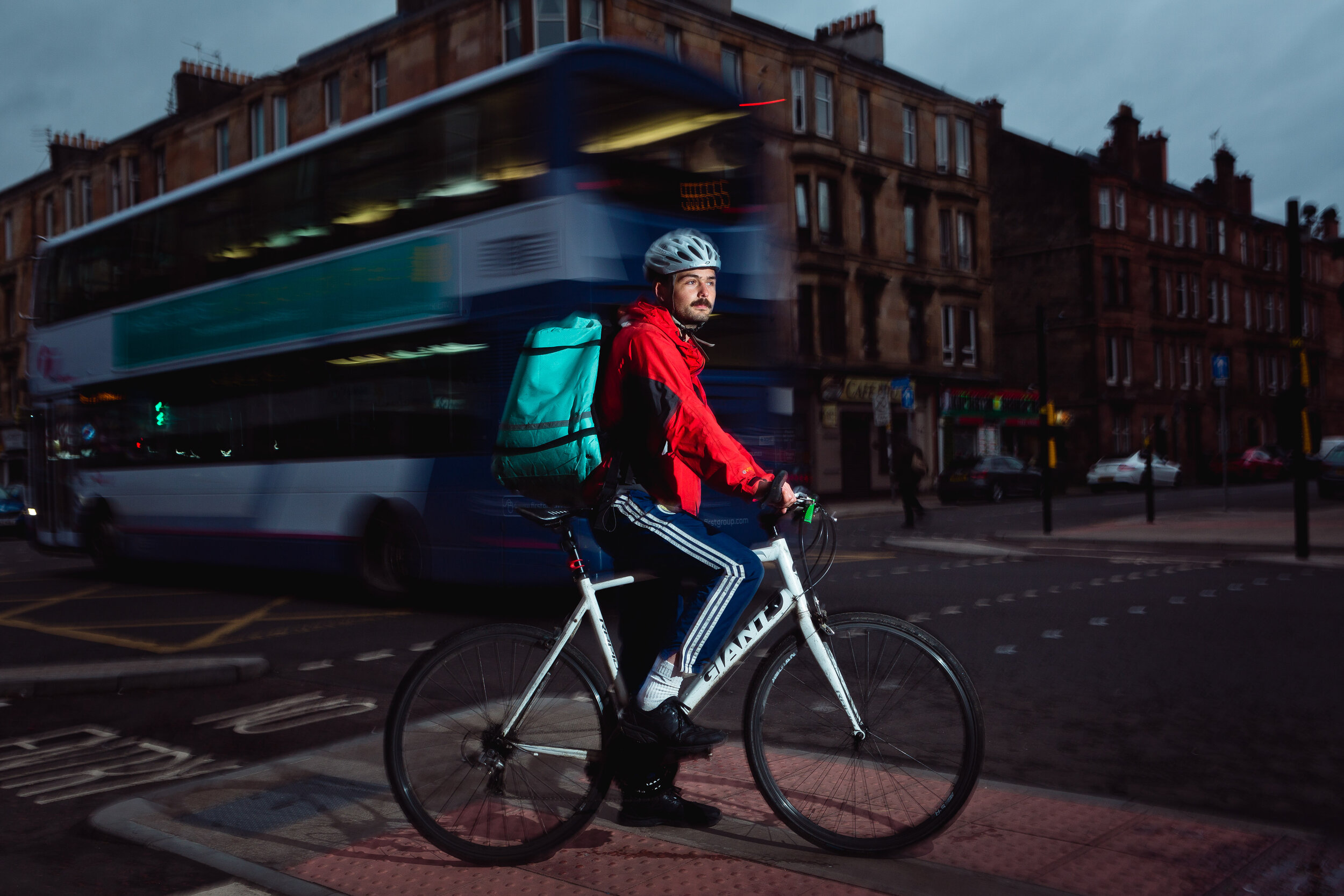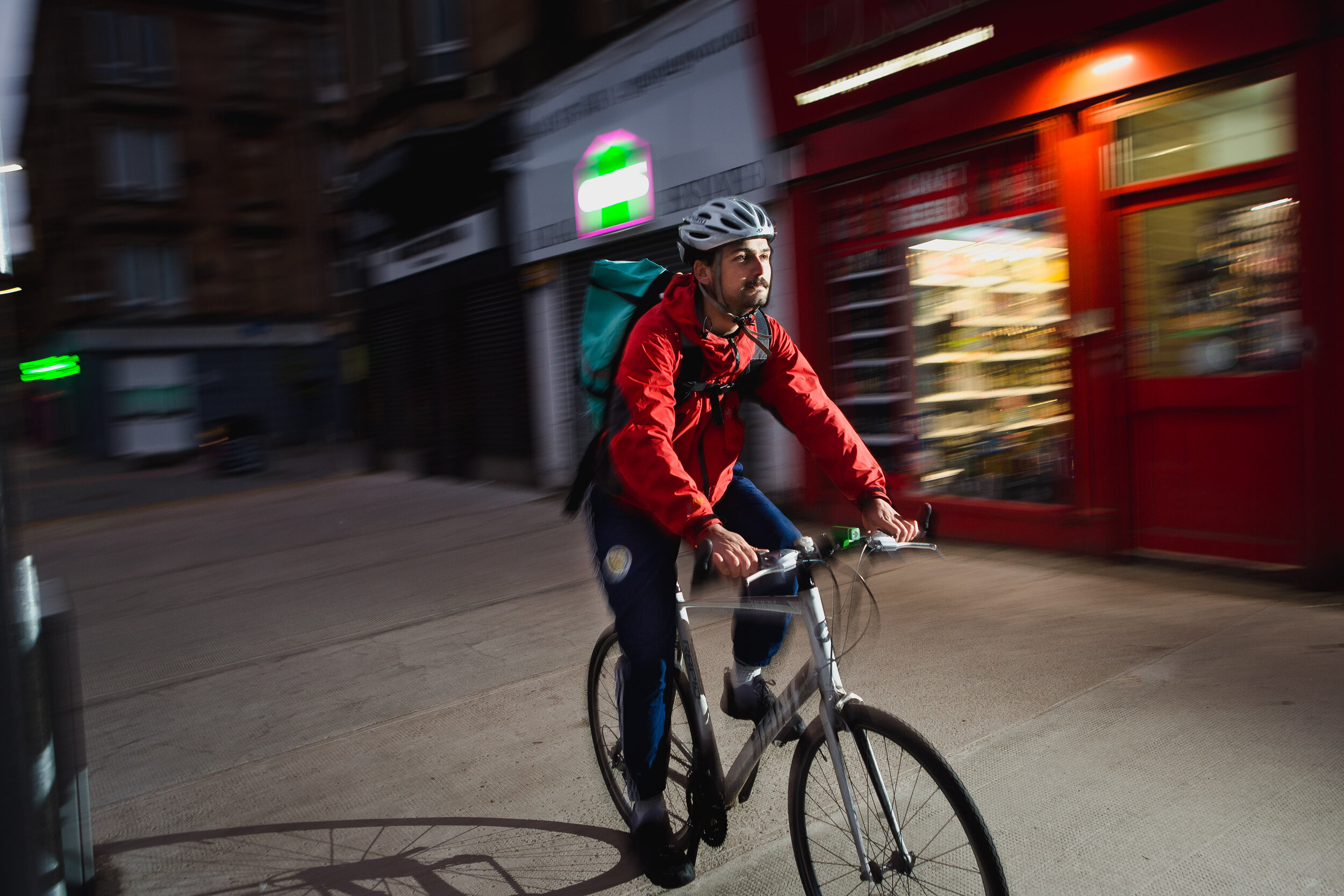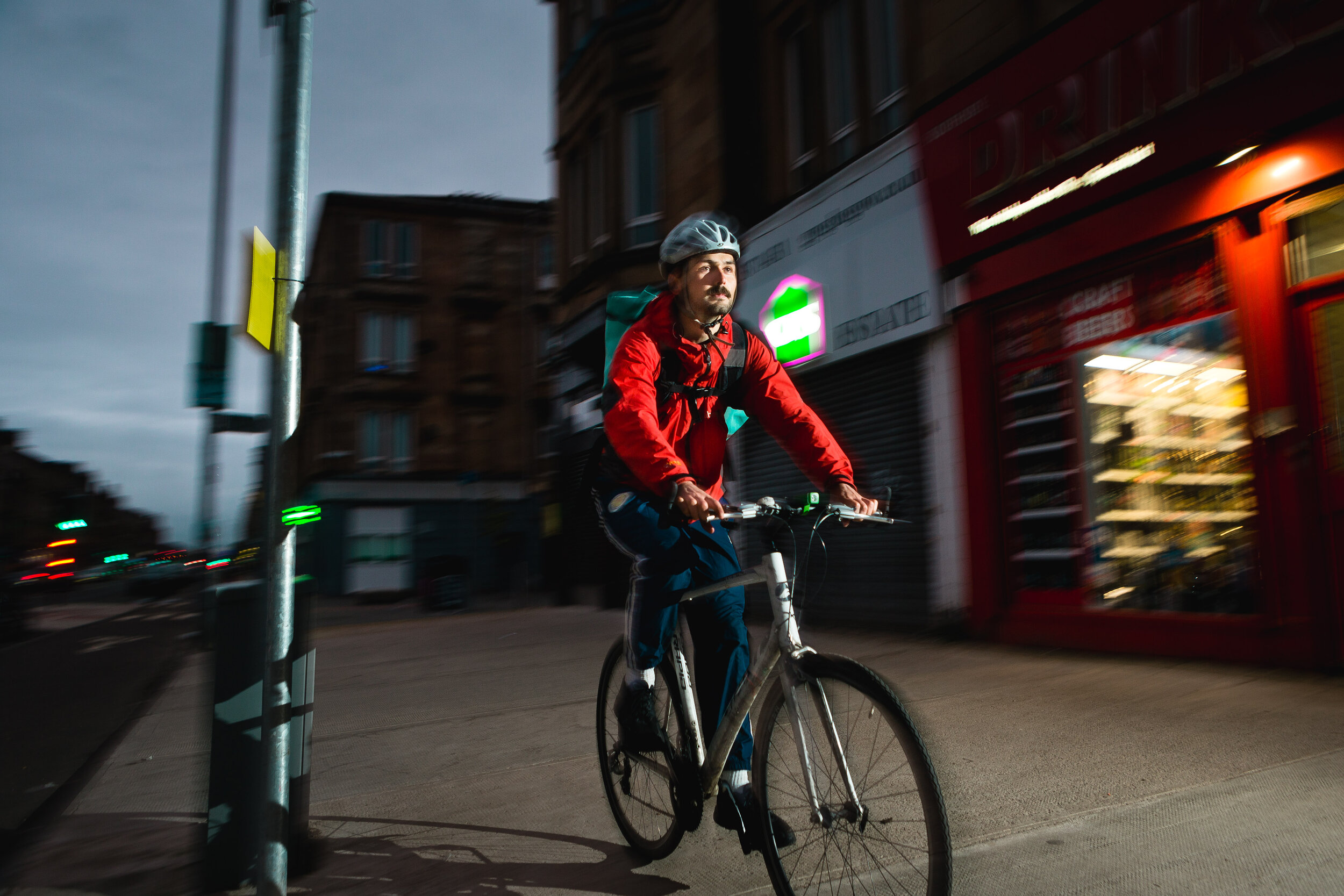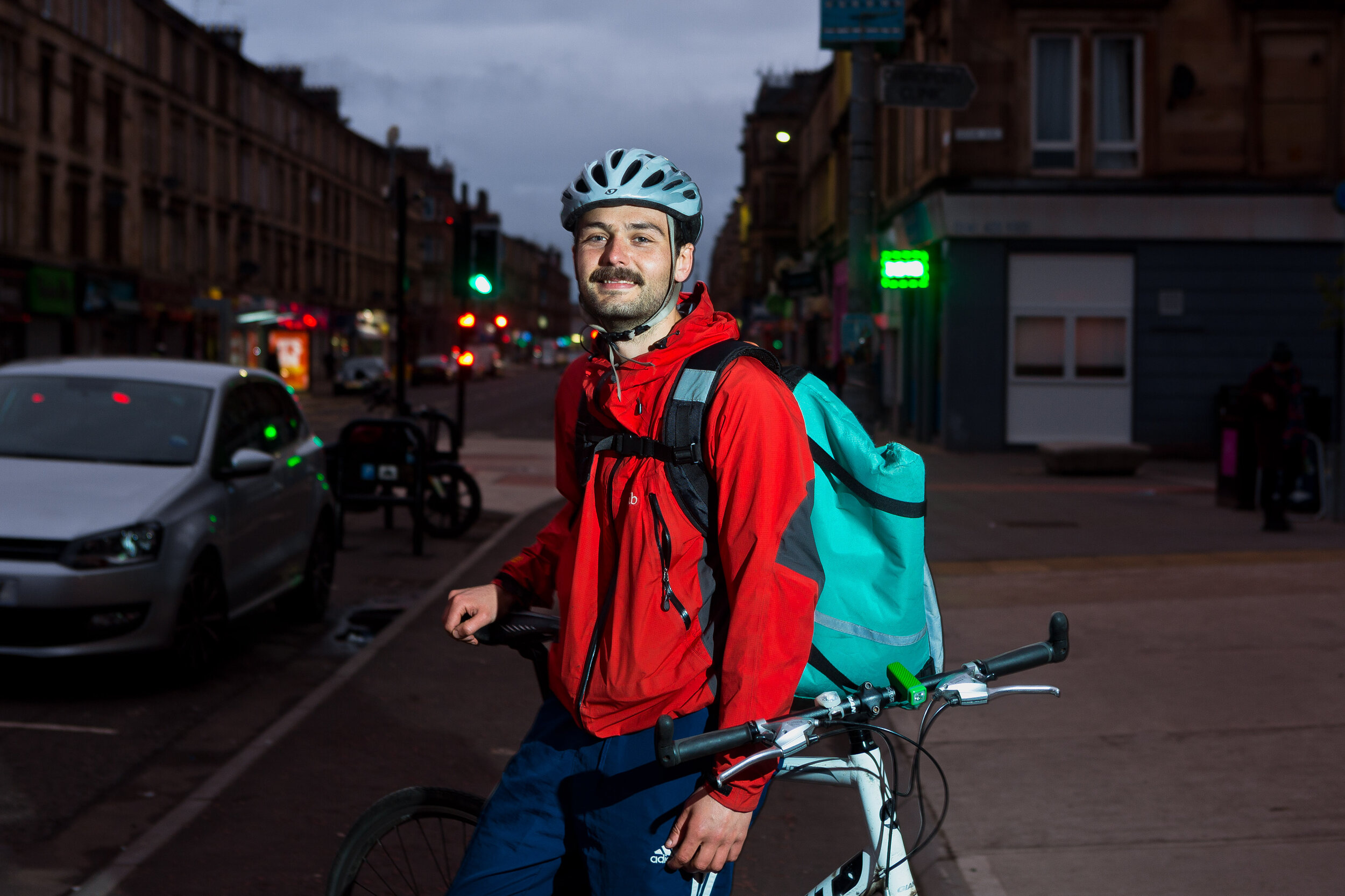Delivering Your Dinner: A Deliveroo Rider’s Perspective
Originally published in our third print issue, Danny Macpherson reveals what it is like to work as a courier with Deliveroo.
Photography: Eoin Carey
By Danny Macpherson
We normally have the streets to ourselves, but not here. Cycling through Glasgow on long lockdown nights is often like navigating an eerie post-apocalyptic wasteland. But here, on Victoria Road, there is still life. People still venture outside to share their neighbourhood with one another. Govanhill sometimes feels like the last pocket of resistance in a city which has been taken over by the turquoise-clad army to which I belong – the Deliveroo riders.
We pass through often, but we don’t hang around. Despite being home to a flourishing cafe and restaurant scene, Govanhill is not fruitful terrain for Deliveroo riders. There are few places to pick up orders from. As Deliveroo takes a cut of up to 30 percent from restaurants, it is large chains – not the small independent eateries found in Govanhill – that dominate the platform.




I meet Thomas, a softly-spoken 18-year-old chemical engineering student. He is a newbie, you can tell as much by his shiny branded gear and his generally cheerful demeanour. He is a living, breathing advert for Deliveroo, embodying the image the company likes to present of its workers – youthful, bright-eyed, stress-free, enjoying the freedom that comes with riding outdoors and earning money when it suits them.
Similarly, I first started riding for Deliveroo just after university. Weary of abstract academic life, there was something thrilling about the physical immediacy of the labour – ride a bike up a hill, work up a sweat, make someone smile as you hand over their weekend treat. In a very small way, it made some tangible difference in the world. For an introvert like myself, it was the perfect gig – spending all day on my bike, listening to music and podcasts, not having to answer to anyone.
For the urban explorer, there is no better way to learn about a city than by working the streets as a delivery rider. I moved to the Southside just before lockdown. Within a few weeks, I had picked up a taxi driver’s knowledge of the roads. From my saddle, I observe the everyday happenings across the city and feel like I could write a Glaswegian version of The Wire. I get a vivid impression of the stark contrasts the city throws up; I can ride through the vibrancy of multicultural Govanhill and then five minutes later find myself in the staid suburbia of Newlands. I also get to see strangers at unusually intimate moments – stoners grinning as they collect a munchie box in just their pants, strangers’ arms sheepishly reaching around the door to snatch away the KFC bucket ordered on a Monday afternoon.
Basically, doing takeaway deliveries can be a pleasurable and interesting activity. And although Deliveroo gets criticised for the lack of workers’ rights offered to riders, the flexibility certainly has some benefits over traditional employment. Feel tired and don’t really fancy doing that shift? No problem. Have a couple of hours going spare and want to earn a few quid for beers that night? Easy, log on and do a couple of drops.
However, these are only benefits for one faction in the rider community; the hobby enthusiasts – those who have other sources of income and can look forward to more gainful forms of employment in future. There is another, far less privileged camp; those who don’t have anything else to fall back on.
Gabor, a 44-year-old from Hungary, gets the train here and back from Kilmarnock everyday. He spends at least seven hours working the streets, no matter the weather. After briefly being made homeless following the breakdown of his marriage, he started with Deliveroo to keep up with child maintenance payments and stop himself falling into debt. He can’t hang around to talk for long though. With grim determination he zips up his bag and heads off.
Gabor is unlikely to appear in a Deliveroo advert any time soon, but it is people like him who are the true model workers. They are the ones who have been out there toiling on the pothole-ridden roads to bring the locked-up people of Glasgow their Saturday night takeaways. As there is no obligation for riders to work, Deliveroo depends on a large pool of hardcore riders to keep its service up-and-running at all times. On a stormy night, most hobbyists would rather be at home ordering takeaway than outside delivering it. Fortunately for Deliveroo, there is no short supply of people with little choice. Takeaway delivery has been one of the few boom sectors in the COVID-19 recession. In 2020, as unemployment shot up, Deliveroo doubled its number of riders.
It is the full-timers who are exposed to the real inequities of the working conditions which include: unsociable hours, no chance of progression, no holiday pay, no guarantee of even being paid. Deliveroo are keen to highlight that riders make more than minimum wage on average, but order fees have gone down in the past couple of years and it’s possible to spend hours on shift just waiting for an order and thus for any pay at all.
Public perception of riders does seem to have improved since the start of the pandemic, which is hardly a surprise, given that takeaways suddenly became the highlight of the week for many. However, this gratitude didn’t necessarily translate into increased generosity. Tipping remains the exception. A polite ‘thank you’ at the door doesn’t always feel like sufficient reward for cycling through torrential rain and hauling a packed thermal bag up three flights of stairs, especially knowing that the same customers would automatically tip the people who bring them their food in restaurants.
Deliveroo is a profoundly impersonal system. To the customer, the rider appears as nothing more than a moving dot on a screen. Everything is controlled by an algorithm, which can be prone to inflicting random acts of cruelty. A rider may accept an order that seems like a five-minute job only to realise the app got the address mixed up and that in reality a 40-minute round trip to the other end of town will be required. With no extra compensation for the time and effort it can start to feel like being in an episode of Black Mirror in which a malevolent computer programme forces you to complete tasks for your economic survival.
Uber’s recent defeat in a Supreme Court battle over workers’ rights suggests that change could be around the corner, but for now, the game remains the same for food couriers. As lockdown lifts and people have more ways to treat themselves, it’s likely that orders will go down and lots of riders will be resigned to loitering on the street waiting for their phones to ping.
Despite everything, I still like doing Deliveroo. I still enjoy being paid to cycle. Being part of the diverse legion of riders who patrol the city streets has been a unique way to experience this moment in history. I just wish we could be treated a bit better.
